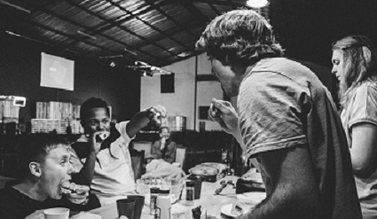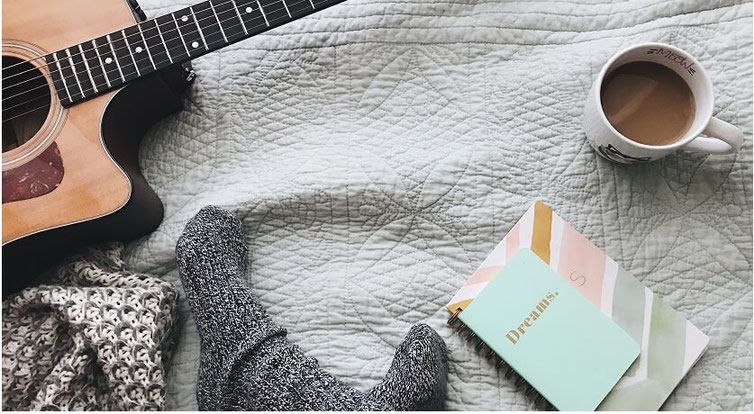By Cailin Crosby

Over the holidays we often let many of our normal routines fall by the wayside; healthy eating, sleep schedules, exercise regimes, usual pastimes. And amidst all the excitement, planning, and activity we may also end up neglecting our self-care and boundary setting habits.
The holidays can produce their own host of unique stressors from financial strain to social obligations, to navigating challenging conversations with family. On top of that is the stress of attempting to manage your own expectations throughout it all.
These expectations, coupled with a lack of self-care and a loosening up on our personal boundaries, can quickly lead to feelings of stress or agitation. We may feel pressure to squeeze in as many social events or family commitments as possible, out of a sense of obligation. Alternatively, we may be excited for the liveliness of the holidays and want to fit it all in, but we end up stretching ourselves thin.
Whether you are anxiously awaiting the hustle and bustle of the season or quietly dreading it there are some approaches to help get you through.
Boundary setting as self-care
It’s a common misconception that if we take time to care for ourselves, we’re somehow taking away time we could be giving to others. The reality is that taking time to care for yourself is exactly what will allow you the ability to give your authentic self and time to those you actually want to give it to (and not feel resentful or exhausted while doing it!). Research on self-care and compassion cultivation has shown that practicing self-compassion can increase compassion for others, as well as reduce depression, anxiety, stress, and avoidance. In other words, give yourself permission to put your needs first; your self-care is truly very selfless!
Fortunately, self-care doesn’t necessitate spending any money; it doesn’t have to be a spa day or a shopping spree or an exotic vacation. Self-care can be as simple as saying “no” to one more social outing, “no” to one more favour, “no” to one more errand. Self-care can be going into a separate room during a family gathering and closing the door behind you, taking some deep breaths and grounding yourself.

Saying “no” is establishing a boundary; although, when it comes to certain holidays or special occasions, it can be one we feel less comfortable setting. When it’s our inclination to say “yes”, it’s normal that we have to intentionally practice ways to say, and be comfortable saying, “no”. In the case of saying “no” to an event that we know is important to important people in our life, we may recognize that our choice to decline this invitation could cause disappointment or hurt feelings.
Although we cannot control or take responsibility for others’ emotions, we can acknowledge them. Note that acknowledging others’ emotions is not the same as justifying, defending, or apologizing for asserting your needs and setting boundaries. You don’t need to provide an explanation for every act of self-care; your needs are valid (and hey, you already have science backing you up on this!).
So, how can we establish boundaries and engage in self-care while still being mindful of others? Here are some suggestions:
- I appreciate the invite but I won’t be able to make it.
- Thanks for thinking of me but I can’t tonight.
- My week is packed. Can we touch base in the new year to make plans to meet up?
- I'm feeling a bit under the weather. I think I just need a night in to rest up.
- I always have so much fun at that party! Unfortunately I can't make it this year.
- I would love to see you while you’re in town; can I get back to you with a date that works better for me?
Anticipating challenges
We all know what they say about best laid plans…So how can we prepare for the unknown? While we can never fully predict or plan for every future challenge, we can control our own responses to them.
We can’t control what events we do or don’t get invited to, what family members, friends or co-workers will say or
how they might act, but we can control what we choose to focus on and how we choose to respond. Most importantly, we have control over how we take care of ourselves. We can choose to prioritize
our own self-care, to practice self-compassion and to establish healthy boundaries; this is what will enable us to actually respond the way we want to respond to challenging situations.

Self-care you can do anywhere
If you’re traveling over the holidays (or if people are traveling to you), and you predict being in spaces other than your own (or having your spaces taken over by others), here are some quick, portable self-care ideas to have with you:
- Listen to music
- Spend time with animals
- Plan to cook a recipe that you love
- Write in a journal
- Get some physical exercise
- Allow yourself to lay in bed for a few more minutes
- Create an errand to run and orchestrate some alone time
- Download a new podcast
- Step outside and breathe in the fresh air
- Bring a book; find an opportunity to slip away and indulge in a quick chapter (or even a page!)
- Listen to a short, guided meditation
- Try a self-compassion exercise
- Stay close to someone who makes you feel safe
If you plan to use some of these self-care strategies over the holidays, why not try doing them mindfully? If you’re cooking a recipe you love, trying cooking mindfully - noticing all the smells, tastes, sounds and textures of the ingredients that you’re working with. When you step outside to breathe in the fresh air, notice the sights around you, the feel of the air on your skin, the smell of the world outside. Not sure what I mean by doing things ‘mindfully’? Check out my first post on mindfulness to get a quick overview!
Do you struggle with setting boundaries? Let's work toward a solution.
